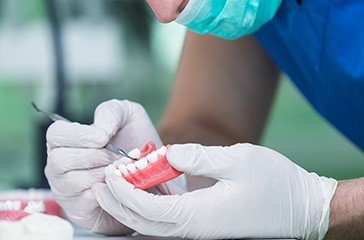What are Relines?

Wait, is that a spelling mistake in the title of this article? Don’t you mean re-align? Not exactly. Reline refers to redoing the fitting of a denture that comes into contact with your gums. This procedure is particularly needful very early in the life of a new denture wearer. Let me explain.
When you first get your dentures, teeth have been pulled from your mouth. The bone structure necessary to maintain a solid footing for those teeth is no longer required and starts to break down and get re-absorbed back into the body for other uses. We call this “absorption” or “resorption”. When bone is re-absorbed back into the body, gums actually change from what it used to be. The effects of this change are not only felt inside your mouth with how your dentures do or don’t fit anymore, but also outside in how such changes affect your face shape, smile, and facial expressions.
These changes occur rapidly at first, causing most denturists to recommend a temporary reline until such changes slow down. Temporary relines, known as tissue conditioners, use softer material that more easily molds to the new denture-wearer’s mouth. When the resorption finally slows down 10 months to a year later, denturists will then change a person’s denture to a hard reline and put the wearer on a two-year schedule.
Why do I need relining every two years?!
Typical changes occur with age in a normal, healthy person, whether due to sudden changes or shifts in jaw line due to reduced bone. Dentures eventually no longer fit as well as they did when they were first put in. Reline procedures take a new mold of the gums and fit a new fitting surface to the underside of the denture to have it fit well again. It is therefore extremely important to maintain a regular check-up schedule. Failure to engage in regular check-ups between relines can lead to sores, rubbing, ill-fitting, increased looseness and instability. Ill-fitting dentures can cause long-term damage or even mouth cancer. It is imperative then, that changes in the mouth be caught early rather than late, to avoid these problems and to ensure ongoing excellent fit and usage.
If a person’s regular check-ups don’t reveal any impending health problems, the dentures should still be relined every two years to extend their lifetime use. As with all mechanical things, they will eventually breakdown, snap, crack, discolor, or simply stop working the way they were designed and will need replacing. However, with regular relines, one set of dentures can last as long as 5 to 8 years on average before they need replacing.
So now you know! When was the last time you had your dentures relined?


